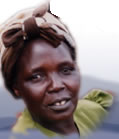THEMES IN THIS
TESTIMONY
Agriculture

Communications

Environment

History

Spiritual Beliefs

Click on arrows
to find more
testimonies
featuring
these themes
|
|
Sex
|
Male
|
|
|
Age
|
60
|
|
|
Identity
|
Sabaot
|
|
|
Occupation
|
Farmer
|
|
|
Location
|
Kibuk
|
|
|
Date
|
1997
|
|
summary
Though this is a short interview, it gives us a glimpse into the changes in economic livelihood and lifestyle, which the Sabaot of Mount Elgon have experienced over the last 50 years or so. Jackson Miti Kapchanga, who is a farmer and, in his own words was never that interested in education, talks about the shift from an economy mainly based on cattle rearing to one based on crop cultivation. Unlike many of the other older narrators, he describes life as being better as a result of this change, despite increasingly scarce resources which persuaded him not to start a polygamous family: ...if you are a good farmer, when the maize and beans ripen, the children are able to get plenty of food and you can even sell to get some money to solve your financial problems. If you manage one dairy cow properly, it will give you so much milk for consumption and for sale. You can even supply the local hotels with milk. This life is better than the previous one.
Another topic that emerges from this interview is how significant the area is to people, and how frustrated they feel at government environmental restrictions and interferences. This is our mountain and it is ours alone....This mountain has a lot of benefits for us. We get our water supply from the mountain. We feel that if this mountain decides to stop giving us water, we will all die. We fear the mountain a lot. And in relation to official hunting bans: We feel so bad. We are in a pathetic situation. We miss eating the wild meat and yet we can do nothing about it because the government has put tough sanctions on hunting. We feel that if they would be fair to us, they would allow us to go hunting for one month once in a year.
detailed breakdown
|
You will need a password from Panos to view the full
transcript of the interview. To apply for a password, click here.
Once you have a password, click here to go to the beginning
of the transcript. You can also click on any section of the
breakdown of content below and go straight to the
corresponding part of the transcript.
|
| Section 1 |
Narrator describes how when he was young there were no hospitals and his father used to give them herbal medicines for their illnesses. How cattle used to be the main livelihood and there was little agriculture.
|
| Section 2 |
Arrival of Christianity and how gradually most Sabaot joined. Description of traditional religion: We believed our god lived in the sun. In the morning when the sun was rising, we would spit towards the east, asking god to take care of us. Also when we sacrificed, we used to spit blood towards the rising sun for God to accept our sacrifice.
Describes his education: As I grew up to be big, I tried to learn this white man's education. Different standards of education then: If you could school up to standard three or four, you were equivalent to a teacher. How children were forced to go to school because most people preferred them to look after the cattle: People were forced to take their children to school for a long time, until later when they started to realise that those who went to school could become more important people, and it is then that more people opted to take their children to school.
|
| Section 3 |
How in the narrators youth, after circumcision you were meant to pay tax, so many went to work in the white mans farm. How others raised the money to pay the colonialists taxes.
The narrator was not interested in schooling, he was more interested in marrying. He married only one wife due to scarce resources, and because he realised coming from a large polygamous family the more children you have, the more food is required.
|
| Section 4 |
How treatment of disabled children has changed from abandonment to education.
|
| Section 4-5 |
Sabaot attitudes to the mountain. How in the past they used to live in the forest but the government wanted to settled them lower down the mountain: The government decided to move some of us down here. They felt that we would die of famine if we did not cultivate crops. Dependency and respect for the mountain. Government environmental restrictions: In the past, we used to cut down any tree that we required. The government has gazetted (declared it a forest preserve) this forest and has declared that unlicensed felling of trees is not allowed for they are important trees. So we started planting trees including the Elgon teak. Livelihood changes in the narrators life: We grow a lot of food crops these days...We also keep exotic breeds of dairy cattle...We are also able to take proper care of our family from the proceeds we get from selling the milk.
Methods the narrator would use to raise funds to pay for his children school fees.
|
| Section 5-6 |
How the narrator used to hunt as a young man, and animals in the forest sadness and frustration at current government ban on hunting.
Narrator prefers farming to pastoralism. Types of cattle raised in the area. Poor roads make it difficult to find good veterinary service and transport produce to sell in markets.
|
| Section 7 |
Family conflicts over scarce resources and hunger and how the narrator solves them: Hunger is a good teacher. Wishes his children to marry one wife because life now is hard rejected polygamy because felt it would be the best for his children but feels that he may marry another woman later.
|
|


